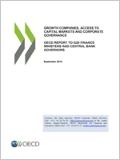Capital markets
Capital markets worldwide are undergoing profound changes and are expected to play an increasingly important role in providing business with access to capital. This is prompting many countries to review the functioning of their capital markets to provide better conditions for financing private sector innovation, investment and growth. Capital market reforms are often supported by more competitive corporate governance regulations, including company law and securities regulation. The OECD reviews the functioning of capital markets, provides international comparisons and proposes how to improve corporate access to capital. This analysis is evidence-based and drawn from a broad spectrum of international experiences with improving national capital formation and private sector competitiveness.
In focus
- The Swedish Corporate Bond Market: Challenges and Policy Recommendations
- Corporate Bond Markets in Asia: Challenges and Opportunities for Growth Companies
- OECD Corporate Goverance Factbook 2023
- OECD Capital Market Review of Romania 2022
- Coporate Finance in Asia and the COVID-19 Crisis
- The Future of Corporate Governance in Capital Markets Following the COVID-19 Crisis
Capital market reviews
Building on original firm and transaction level data, these reviews provide a detailed analysis of the corporate sector and corporate finance landscape in individual countries, covering public equity markets, corporate bond markets, institutional investors, market intermediaries and the functioning of secondary markets. They offer concrete policy recommendations on steps that can be taken to improve companies’ access to market-based financing and investor confidence. The objective is to help countries to effectively bridge the gap between household savings and productive investment opportunities in the real economy.
OECD Capital Market Review of Spain (ongoing)
OECD work on Swedish capital markets (ongoing)
OECD Capital Market Review of Romania 2022
OECD Capital Market Review of Croatia 2021
OECD Capital Market Review of Portugal 2020
Equity markets
Equity capital supports forward looking long-term investments that include research, development and innovation with uncertain outcomes. It also serves for investments in intangible assets that do not have the well-defined collateral often required for traditional loans.
OECD Equity Market Review of Asia 2019
Owners of the World's Listed Companies
Who Cares? Corporate Governance in Today’s Equity Markets
Corporate bond markets
Worldwide, corporate bond markets have become an increasingly important source of corporate finance, especially for non-financial companies. This means that policy makers, regulators and market participants need access to a comprehensive empirical overview of corporate bond market developments and an analysis of the structural issues that accompany these trends.
Corporate bond market trends, emerging risks and monetary policy
Corporate bonds in a time of unconventional monetary policy
Institutional investors
 Institutional ownership of publicly listed companies is dramatically increasing in most countries and a number of new institutions have become significant owners alongside the more traditional institutional investors, such as pension funds and investment funds. These developments have given new impetus to the discussion about the role of institutional investors in capital allocation and as owners of publicly listed companies.
Institutional ownership of publicly listed companies is dramatically increasing in most countries and a number of new institutions have become significant owners alongside the more traditional institutional investors, such as pension funds and investment funds. These developments have given new impetus to the discussion about the role of institutional investors in capital allocation and as owners of publicly listed companies.
Capital market structure
 Profound structural changes have swept through the stock exchange industry in recent years. Most traditional stock exchanges are now public companies whose shares are listed on their own stock exchanges. Public equity markets have become characterised by fragmentation of trading between stock exchanges and other trading venues. Among the forces driving these trends are advancements in information and communication technology, supported by regulatory reforms that promote competition between different trading venues.
Profound structural changes have swept through the stock exchange industry in recent years. Most traditional stock exchanges are now public companies whose shares are listed on their own stock exchanges. Public equity markets have become characterised by fragmentation of trading between stock exchanges and other trading venues. Among the forces driving these trends are advancements in information and communication technology, supported by regulatory reforms that promote competition between different trading venues.
The business models of stock exchanges and stock market fragmentation
Growth companies
 Growth companies play a critical role in economic development but growth requires investment and long-term investment requires patient capital. Companies with the potential to grasp commercial opportunities of scale and scope need to have access to market-based financing. This access is only possible if these companies can meet investor expectations with respect to corporate governance practices.
Growth companies play a critical role in economic development but growth requires investment and long-term investment requires patient capital. Companies with the potential to grasp commercial opportunities of scale and scope need to have access to market-based financing. This access is only possible if these companies can meet investor expectations with respect to corporate governance practices.
Growth companies, access to capital markets and corporate governance


